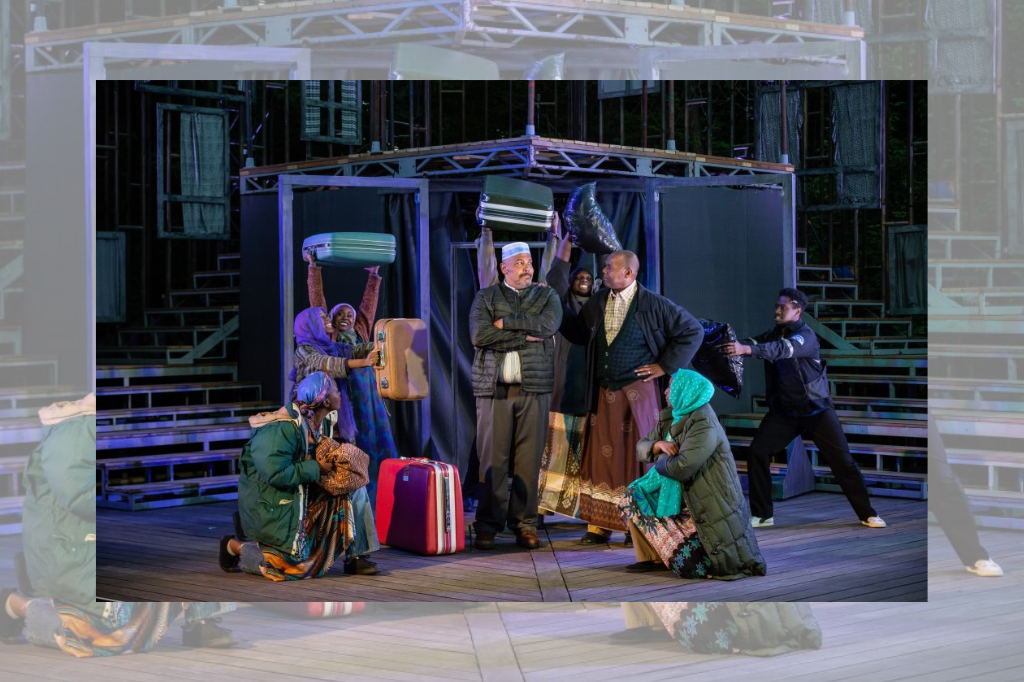REVIEW: Dixon Road at Musical Stage Company/Obsidian Theatre in Association with Canadian Stage
Fatuma Adar might be Toronto’s response to Lin-Manuel Miranda. She’s written the book, lyrics, and music to her new musical Dixon Road — the only thing she’s not doing is acting in it.
And while Dixon Road, having its world premiere in the High Park Amphitheatre, may have a few structural and musical hurdles left to scale (hey, so did Hamilton after its first workshop), the show looks to have a promising future, as does Adar.
Dixon Road follows a Somali family which, in the early 1990s, relocates to Canada to escape the escalating conflict in Somalia. Daughter Batoul (a radiant Germaine Konji) narrates the journey from there to here, introducing us to her family and recounting the growing pains that accompanied a major international move. Batoul’s father, Zaki (the charming Gavin Hope), is a former photographer, who in Somalia was a highly regarded diplomat: in Toronto he’s a taxi driver. Mother Safiya (a sweet and tuneful Starr Domingue) is a housewife suddenly starved of community. Batoul, in a new country, is now surrounded by opportunities which only weeks ago would have been impossible to take. Here, she could be anything — a writer, an artist, an engineer. A housewife only if she so chooses.
The musical’s setting is sort of, loosely, Toronto — the Dixon Road for which the project has been named doesn’t much appear in either plot or scenography. Dixon Road is home to a vibrant Somali community (one extremely important to Adar’s own history), and we get whispers of that here, but they’re infrequent: I wanted more. Thematically, Dixon Road has much in common with In the Heights, West Side Story, even Fiddler on the Roof — stories of immigration and identity, musical theatre predecessors which richly paint a portrait of the locales which inspired them. Dixon Road still has room to grow in this area, and will be all the stronger once it does.
Plot-wise, too, some threads are left for Adar to untangle — Batoul, in an act of love for her father, misses a major immigration court hearing, an error which garners remarkably few consequences. Dixon Road’s ending, too, is surprisingly open: we never learn what Batoul chooses to do with her life as an adult, which, given that choice forms much of the emotional thrust of the show, is surprising. Dixon Road’s story is a sweet one, and I so look forward to seeing it continue to grow.
Adar’s music is catchy (and, for an outdoor production at High Park, impeccably arranged). Songs pull from different genres — there are quite a few rapped lyrics — and they drive the plot forward, for the most part. Some rhymes are a little on-the-nose, some songs are a little redundant, but for the most part, Adar’s got a solid, workable score here, which with further workshopping and trimming will surely polish into a glossy cast album. Right now, the show (which is mostly sung-through) stands at two and a half hours: there’s room for further cuts.
Ray Hogg has created a lovely experience in the High Park Amphitheatre, leaving Adar’s work to shine centre stage. Set by Brian Dudkiewicz beautifully evokes the spareness of expat life — scenes in Somalia are colourful and textured, whereas scenes in Canada are grey and directionless by comparison. And yet that choice almost feels counterintuitive in a show highlighting the diversity and vibrancy of Dixon Road as a neighbourhood — it’s double-edged. Hogg’s choreography, too, is simple and understated, ensuring lyrics don’t get lost in a sea of movement or visual fuss.
Dixon Road is a highly relatable story of immigration and the search for community: in it I saw my own relocation to Canada, and my parents’ to the US in the late nineties. Adar has a powerful story to tell, with a smart director and wholly capable cast — I’ve no doubts we’ll be seeing a more polished Dixon Road in a few years (a mosquito-free Dixon Road with easier access to its theatre).
Dixon Road runs at the High Park Amphitheatre through June 19. Tickets are available here.














Comments